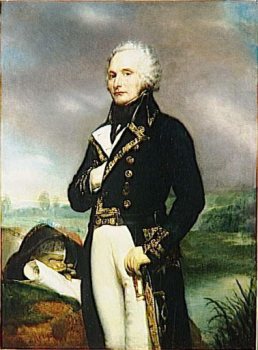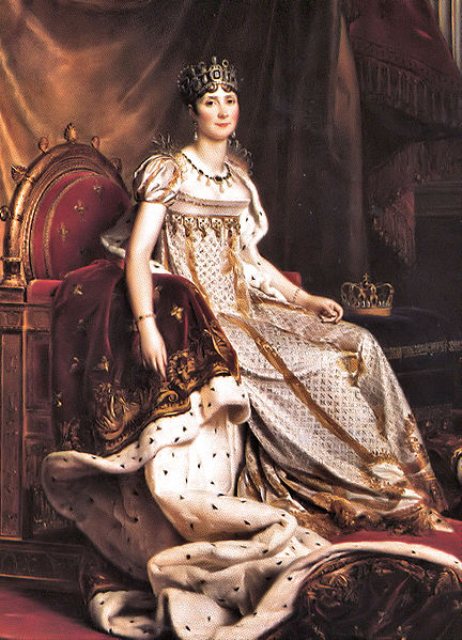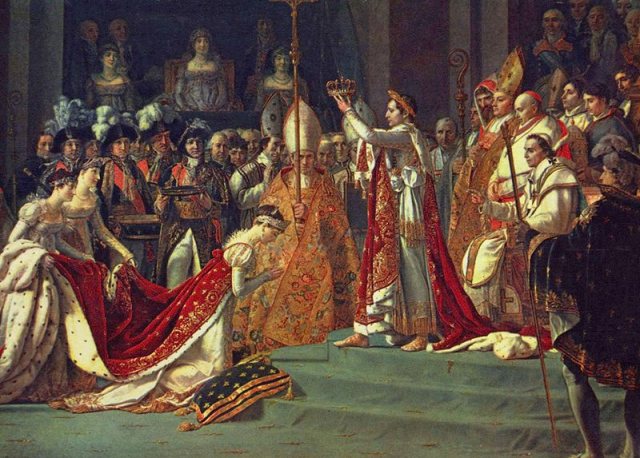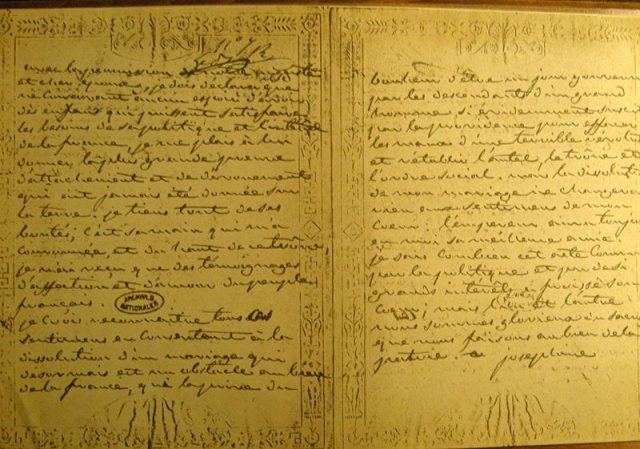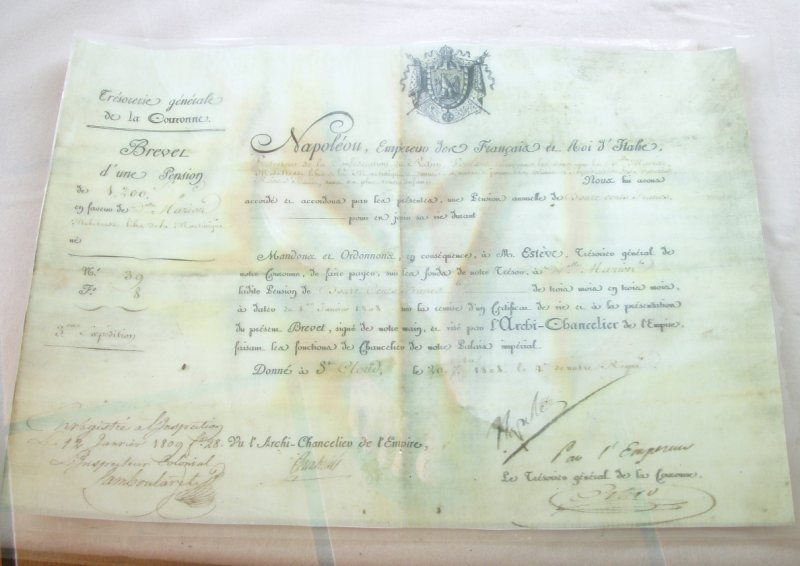Josephine

|
Josephine
Marie Josèphe Rose Tascher de la
Pagerie was born in
Les Trois-Ilets, Martinique, on the 23rd of June 1763 , to a wealthy
white Creole family that owned a 200 acre, sugar plantation with 150 slaves. She was one of three
daughters of Joseph-Gaspard Tascher (1735-1790), chevalier, seigneur de la Pagerie,
lieutenant of Troupes de Marine, and his wife, the former Rose-Claire des
Vergers de Sannois (1736-1807), whose maternal grandfather Anthony Brown, was
English. Josephine's father was a womaniser and gambler who could not afford to repair the family home after a hurricane destroyed it in 1766, so at the age of three Josephine, her two sisters and parents moved into the attic of their sugar factory. Edmée, Joséphine's paternal aunt, had been the mistress of François, vicomte de Beauharnais, a French aristocrat. When François' health began to fail, Edmée arranged the advantageous marriage of her niece Catherine-Désirée to François' son Alexandre. This marriage would be highly beneficial for the Tascher family, because it would keep the de Beauharnais money in their hands; however, 12-year-old Catherine died on the 16th October 1777 before leaving Martinique. In service to their aunt Edmée's goals, Catherine was replaced by her older sister Joséphine. In October 1779, Joséphine went to France with her father. She married Alexandre on the 13th of December 1779, in Noisy-le-Grand at the age of sixteen.
Alexandre François Marie de Beauharnais, Vicomte de Beauharnais was born on the 28th of May 1760 in Fort de France, Martinique. His paternal grandparents Claude de Beauharnais (1680 – 1738) and Renée Hardouineau (1696 – 1744) were married in La Rochelle during 1713. His father Francois de Beauharnais, Marquess de la Ferte-Beauharnais (1714 – 1800) served as Governor of Martinique. Alexandre was the third of three sons born to him by his first wife Marie Henriette Pyvart de Chastullé (1722 – 1767) - the first died in infancy, and the second was Francis VI of Beauharnais. His father was remarried in 1796 to Eugenie de Tascher de la Pagerie (1739 – 1803).
Alexandre fought in Louis XVI's army in the American Revolutionary War. He was later deputy of the noblesse in the Estates-General. He was made general in 1792 during the French Revolution, he refused in June 1793 to become Minister of War. He was named General-in-Chief of the Army of the Rhine in 1793. Although their marriage was not happy, they had two children: Eugéne de Beauharnais (3rd of September 1781 – 21st of February 1824). Her granddaughter Josephine, daughter of Eugéne, married King Oscar I of Sweden, the son of Napoleon's one-time fiancée, Desiree Clary. Through her Joséphine is a direct ancestor of the present heads of the royal houses of Belgium, Denmark, Greece, Luxembourg, Norway and Sweden. Hortense de Beauharnais (10th of April 1783 – 5th
of October 1837), she married Napoleon’s brother Louis in 1802 and was the
mother of Napoleon III of France.
On the 2nd March 1794, during the Reign of Terror, the Comite de Salut public ordered the arrest of Alexandre. He was jailed in the Carmes prison in Paris. Considering Joséphine as too close to the counter-revolutionary financial circles, the Committee ordered her arrest on the 19th April 1794. Josephine was imprisoned in the Carmes prison until the 28th of July 1794. While her husband, accused of having poorly defended Mainz in July 1793, and considered an aristocratic "suspect", was sentenced to death and guillotined, together with his cousin Augustin, on the 23rd of July 1794, on the Place de la Révolution (today's Place de la Concorde) in Paris, Joséphine was freed five days later, thanks to the fall and execution of Robespierre, which ended the Reign of Terror. In June 1795, a new law allowed her to recover the possessions of Alexandre.
Portrait of the Empress Joséphine, by Francois Gerard
Meeting Napoleon: Joséphine de Beauharnais, now a widow,
worked in a brothel in Paris, meeting and becoming the mistress to several
leading political figures, including Paul Francois Jean Nicolas Barras. She met General Napoleon
Bonaparte, six years her
junior in 1795 and became his mistress. In a letter to her in December, he
wrote, "I awake full of you. Your image and the memory of last night’s
intoxicating pleasures has left no rest to my senses." Joséphine was a renowned
spendthrift and Barras may have encouraged the relationship with Bonaparte in
order to get her off his hands. Joséphine was described as being of
average height, svelte, shapely, with silky, chestnut-brown hair, hazel eyes,
and a rather sallow complexion. Her nose was small and straight, and her mouth
was well-formed; however she kept it closed most of the time so as not to reveal
her bad teeth. She was praised for her elegance, style, and low, "silvery",
beautifully-modulated voice. In
January 1796, Napoléon Bonaparte proposed to her and they married on the 9th
of March 1796. Until meeting Bonaparte, she had always been known by the
name of Rose, but Bonaparte preferred to call her Joséphine, the name she adopted from
then on. Two days after the wedding, Bonaparte left to lead the French army in
Italy, and during their separation, he sent her many love letters. In February
1797, he wrote: “You to whom nature has given spirit, sweetness, and beauty, you
who alone can move and rule my heart, you who know all too well the absolute
empire you exercise over it!” Many of his letters are still intact today, while
very few of hers have been found; it is not known whether this is due to their
having been lost or to their initial scarcity. In the meantime Joséphine, left behind
in Paris, began an affair in 1796 with a handsome Hussar lieutenant, Hippolyte
Charles. The rumours that reached Bonaparte so infuriated him that his love for
his wife was forever damaged. During the Egyptian Campaign of 1798, Napoléon started one of many affairs of his own with Pauline Bellisle Foures, the wife of a junior officer who became known as "Napoleon's Cleopatra." His letters to Josephine became less loving. No subsequent lovers of Joséphine are recorded, but Napoléon continued to take on mistresses. In 1804, he said, "Power is my mistress."
Joséphine kneels before Napoléon during his coronation at Notre Dame.
An Empress: Shortly before their coronation, there
was an incident at the Chateau de Saint-Cloud that nearly sundered the marriage
between the two. Joséphine caught Napoléon in the bedroom of her
lady-in-waiting, Elisabeth de Vaudey. Napoléon threatened to
divorce as Josephine had not produced an heir, impossible as she was
infertile either to the stress of her imprisonment during the Terror having
triggered menopause, or to injuries she suffered in a fall from a collapsing
balcony in 1798. Eventually, however, through the efforts of her daughter
Hortense, the two were reconciled. The coronation ceremony, officiated by Pope Pius VII, took place at Notre-Dame Cathedral in Paris, on the 2nd of December 1804. Following a pre-arranged protocol, Napoléon first crowned himself, then put the crown on Joséphine's head, proclaiming her Empress. In the painting above Josephine's mother was "painted in", she was not there as the invitation arrived in Martinique by ship two months after the event had taken place. When, after a few years, it became
clear she could not have a child, Joséphine agreed to a divorce so the
Emperor could remarry in the hope of having an heir. The divorce took place on
the 10th of January 1810. The following day, Napoléon married by proxy, Marie Louise of Austria; the formal ceremony took place at the Louvre on the 1st of April. The marriage produced a son but he died aged twenty one.
Later life and death: After the divorce, Joséphine lived at the chateau de Malmaison near Paris on a pension of two million francs. She remained on good terms with Napoléon, who once said that the only thing to come between them was her debts. Joséphine died of pneumonia on the 29th of May 1814, four days after catching cold during a walk with Czar Alexander in the gardens of Malmaison. She was buried in the nearby church of Saint Pierre-Saint Paul in Rueil. Her daughter Hortense is interred near her.
Josephine's Pension amazing to see a document signed by Napoleon on display at La Pagerie. A huge thank you to Carole for all her time.
Napoléon claimed to a friend, while in exile on Saint Helena, that "I truly loved my Joséphine, but I did not respect her." Despite his numerous affairs, eventual divorce, and second marriage, the Emperor's last words on the Island of St. Helena were "France, the Army, the Head of the Army, Joséphine."
ALL IN ALL QUITE A WOMAN
|

